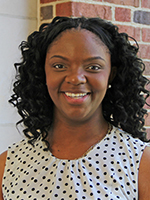2018 Colonial Services Long-Term Care Research Award Recipient

Apr 20, 2018
 The Colonial Services Long-Term Care Research award is presented to a gerontology graduate student for outstanding research or program development in long-term care. The award is funded by a contribution from Colonial Senior Services of Hamilton, Ohio to the Scripps Gerontology Center. The 2018 awardee is Nytasia Hicks.
The Colonial Services Long-Term Care Research award is presented to a gerontology graduate student for outstanding research or program development in long-term care. The award is funded by a contribution from Colonial Senior Services of Hamilton, Ohio to the Scripps Gerontology Center. The 2018 awardee is Nytasia Hicks.Nytasia received her Bachelor’s and Master’s degrees in social work from Wright State University in Dayton, OH. Her original focus was on families and children. After interning at the Dayton Veteran’s Administration and being introduced to older adults, she became interested in gerontology and decided to pursue a Ph.D. in social gerontology at Miami University. Nytasia’s research interests include long-term care, specifically aging in place, minority aging, and health disparities.
Nytasia is currently working on the Our Family, Our Way (OFOW) project. The opportunity to work with Dr. Kathryn McGrew on a project that impacts individuals on a personal level sparked her interest in the OFOW project. The goal of this project is to increase the communication between aging parents and their adult children caregivers in order to facilitate a better care arrangement for all involved. The OFOW team developed a family-directed communication and planning toolkit for older adults and their adult children. They tested the toolkit, implemented it with several families, and then evaluated it.
The OFOW toolkit had a positive impact on the families who used it. According to Nytasia, “the OFOW Guide provided a wide-ranging positive impact of heightened consciousness, brought about by direct communication in these families. The communication amongst the participating families largely included recognition of perceptual incongruence where families identified whether or not they were on the same page or even "seeing eye-to-eye" on aspects of the care arrangement. A major benefit of the Our Family, Our Way process is the generally positive impact that the tools completion, exchange, and related discussion had on communication within participating families.”

